The process and packaging technology specialist Syntegon, formerly Bosch Packaging Technology, reported stable business performance in 2019. Sales increased to 1.33 billion euros (2018: 1.28 billion euros), and new orders also rose slightly. In the wake of the coronavirus crisis, the systems supplier to the pharmaceutical and food industries is seeing increased demand in its services business. Since interpack – the largest trade show in the industry that was originally scheduled for May – has now been postponed until next year due to the coronavirus pandemic, Syntegon is presenting its latest process and packaging technology at a virtual trade show from today until May 13. In this context, a special focus is on intelligent and sustainable technologies for the pharmaceutical and food industries. Following the introduction of the Syntegon corporate brand at the beginning of the year, the company is also unveiling its new product design for the first time at the event.
Stable business performance in 2019
Syntegon generated annual sales of 1.33 billion euros in 2019, slightly above the previous annual figure. As a result, performance remained stable, despite a downturn in the mechanical engineering sector. Sales are divided roughly equally between the company’s two product segments Pharma and Food. In North America and China in particular, Syntegon saw a significant sales growth in the pharmaceuticals sector. The company has also grown significantly in the food sector in these regions and in Europe. Overall, sales are divided roughly equally between the regions of Europe, North and South America, and Asia, with Europe being the company’s largest market.
New orders in the Food segment grew strongly in 2019 and also remained at their usual high level in the Pharma segment. After the sale of Bosch to CVC Capital Partners in 2019, the company implemented the formation of a stand-alone organization and the launch of the Syntegon brand without any issues.
In his speech during the press briefing, Michael Grosse, CEO of Syntegon, said, "In the fiscal year of 2019, when our company was still part of the Bosch Group, we generated annual sales of 1.33 billion euros, which was slightly above the previous annual figure. As a result, performance remained stable despite a downturn in the mechanical engineering sector. The sales were roughly divided equally between the company’s two product segments Pharma and Food. In North America and China in particular, Syntegon saw significant sales growth in the pharmaceuticals sector. We have also grown significantly in the food sector in these regions and in Europe. Overall, sales are roughly divided equally between the regions of Europe, North and South America, and Asia, with Europe being the company’s largest market. New orders in the Food segment grew strongly in 2019 and also remained at their usual high level in the Pharma segment. As a result of the now completed sale of Bosch to CVC Capital Partners in 2019, our company successfully pushed ahead with the formation of a stand-alone organization and smoothly prepared the launch of the Syntegon brand."
According to Mr Grosse: “Syntegon’s mission is to provide process and packaging technology for a better life. We therefore see it as our responsibility to support the pharmaceutical and food industries with our technologies and be there for our customers as a service partner – especially when things get difficult.”
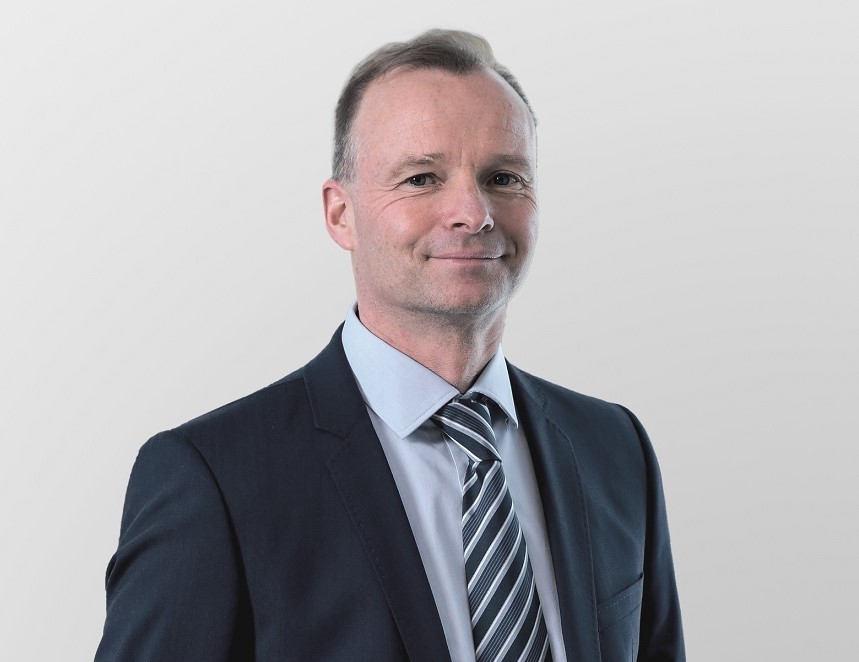
Michael Grosse, CEO of Syntegon Technology
Sustainable packaging
One focus of Syntegon’s first virtual trade show, which the company is holding from May 7 to 13, is technologies for more sustainability. For example, the company is unveiling its new TPU paper form, fill and seal machine for fiber-based primary packaging. Manufacturers of food, hygiene products, and cosmetics, for example, can use it to produce a predominantly fiber-based packaging solution for their disposable and single-serving packs that were previously packaged in plastic. In combination with the special FibreForm paper from paper manufacturer BillerudKorsnäs, the machine forms structural shells that stand out on store shelves and can be completely fed into the paper recycling process.
Syntegon offers retrofit kits that can be used to modify existing systems for use with sustainable materials as well as comprehensive advice on environmentally friendly and efficient packaging processes. One innovation in this field is the “paper-ON-form” retrofit set for horizontal flow wrapping machines, which can be used to process cold-sealable and heat-sealable barrier papers. The set consists of a flow-wrap forming unit and sealing jaws specially designed for the packaging paper. It is already being used on global chocolate manufacturers’ systems to package their products in paper.
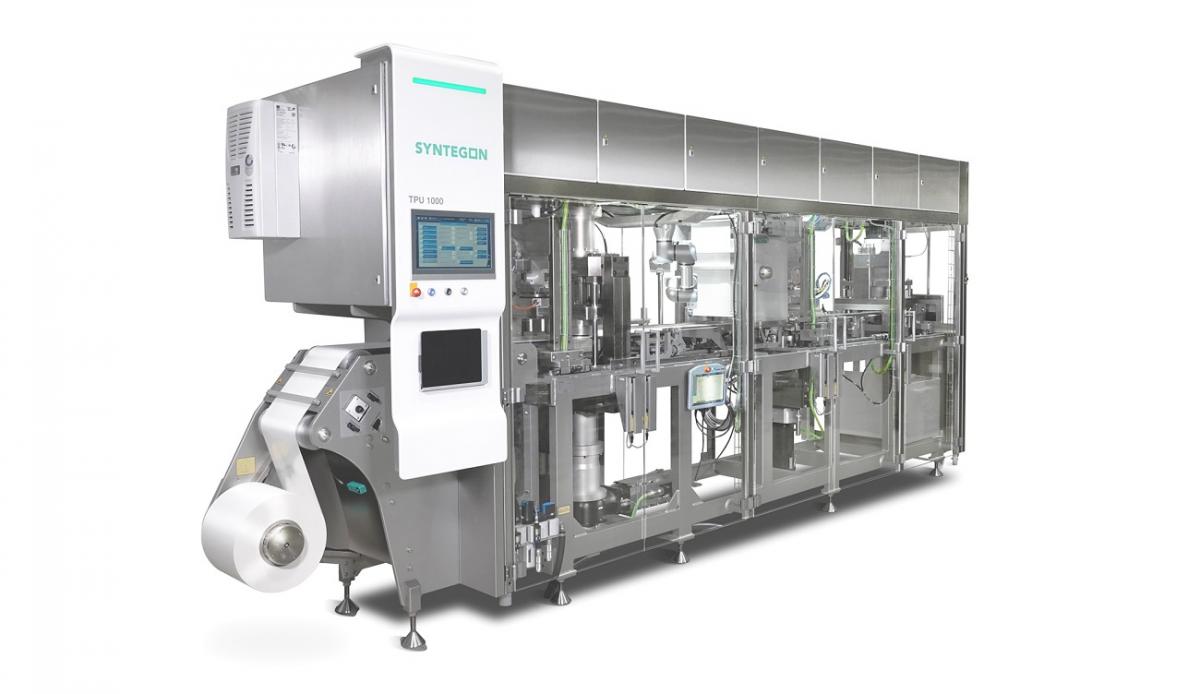
The new TPU paper-forming machine for fiber-based primary packaging
In addition, Syntegon is collaborating with partners on other innovative approaches. For example, new kinds of materials, such as transparent paper, can expand the range of applications for fiber-based packaging – like paper bags with a window, for instance, or replacing plastic trays for cookie packaging with paper solutions.
Intelligent solutions
The new flexible filling portfolio for liquid pharmaceuticals is another highlight of Syntegon’s virtual trade show. The individually configurable, modular machine concept for processing small and medium-sized batches is the intelligent answer to the growing demand for drugs for smaller patient groups. Whether syringes, vials, or cartridges – pharmaceutical manufacturers can select the individual modules they require to create a filling line tailored to their specific needs, including a built-in isolator for aseptic and highly potent active ingredients. At the same time, valuable data can be obtained which, thanks to new software solutions, can be used for tracking and to enhance product safety.
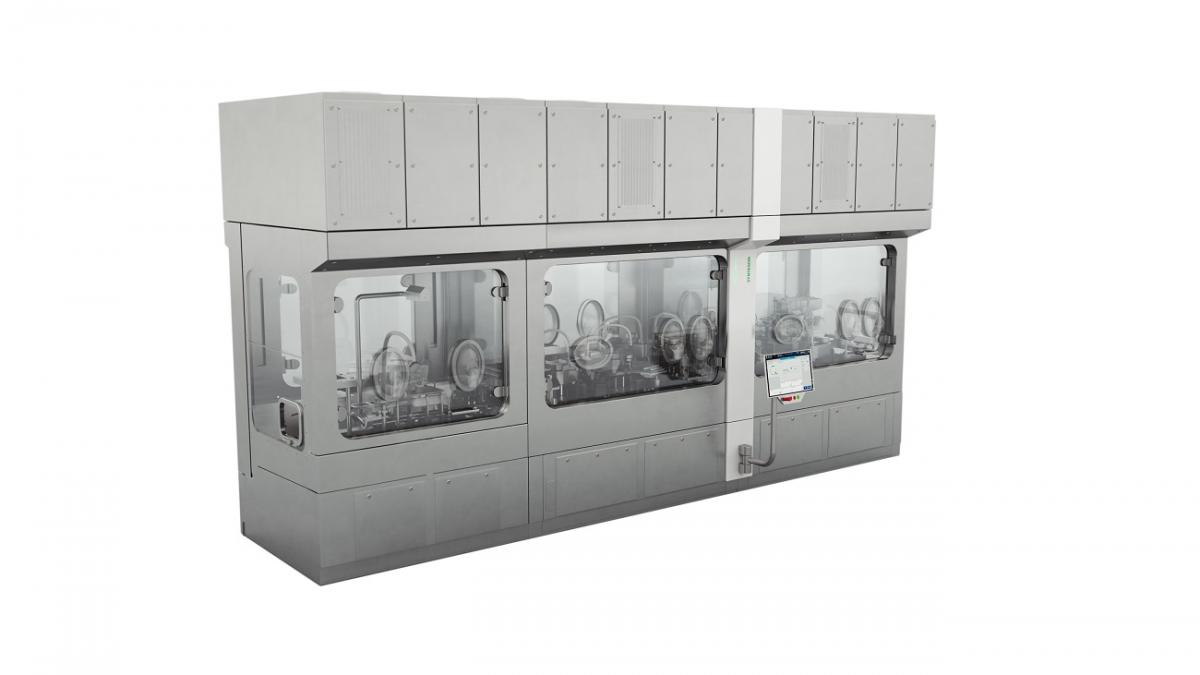
The new flexible filling portfolio for liquid pharmaceuticals offers modular small batch solutions.
Syntegon is also unveiling its new Sepion coater series. The state-of-the-art equipment for tablet coating enables closed material handling during filling, sampling and emptying. This makes the technology suited for coating tablets with highly potent active ingredients. The optimized drum geometry with its sophisticated spraying system improves the flow of process air and reduces process times. In addition, the coaters are highly flexible, with filling capacities ranging from 10 to 100 percent, and are available in six sizes from 175 to 1,000 liters.
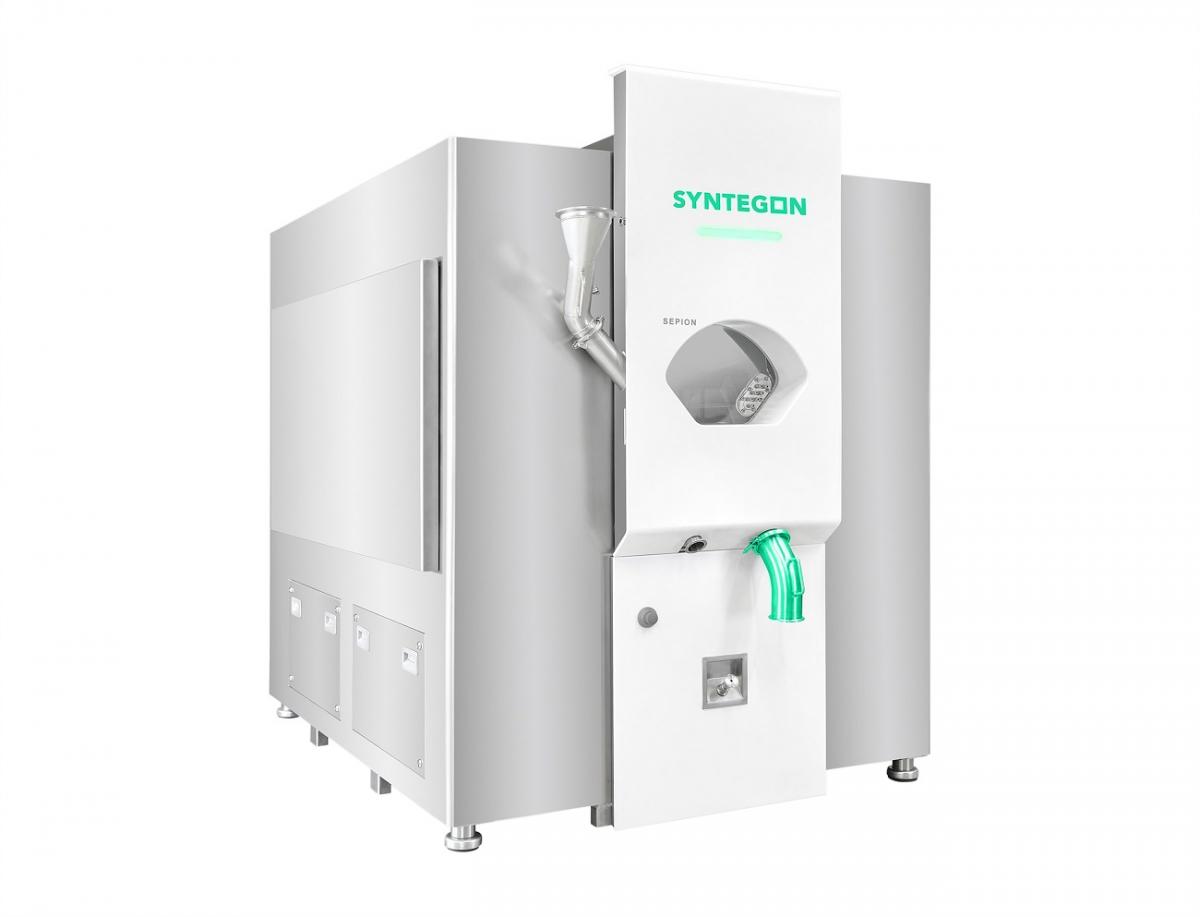
The Sepion coater for tablet coating enables closed material handling during filling, sampling and emptying.
The new ACE (Advanced Carton Erector) platform is another example of Syntegon’s intelligent technologies. The platform features high-speed forming capabilities and can handle a wide range of carton sizes. It forms cartons and trays without glue, instead using a special lock-style or ultrasonic technology for this purpose. The ACE platform is suitable, for example, for packaging used for baked goods, snacks, cereal bars, and frozen goods, as well as for products outside the food sector.
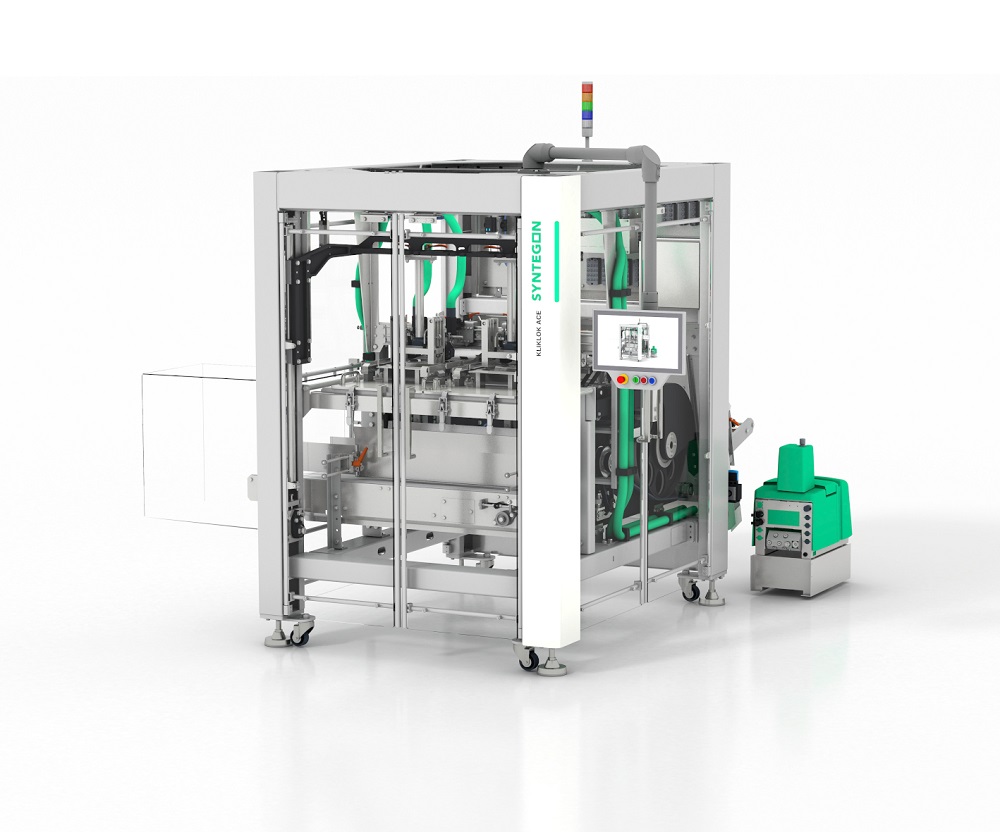
The ACE carton former platform was developed with a particular focus on ergonomic design, sustainability, and increased efficiency.
Challenges in the food market
New machine design
After leaving the Bosch Group, Syntegon has relaunched with its new corporate brand. The name Syntegon stands for synergy, technology, and a focus on the future. The new corporate color green underscores the importance of sustainability and health. These aspects are also reflected in the new machine design, which the company presented today for the first time.
An important feature is the user-friendly interaction zone highlighted in white. It creates a clear user interface and generally makes the machine easy to operate. Components include the optimized human-machine interface (HMI) and a status display. In the future, it will be possible to integrate additional components, such as a wireless charging station for tablets that can be used to run augmented reality service programs. The new design is also easier to clean, which further improves hygiene. All of the company’s new machine platforms will feature this design in the future.














